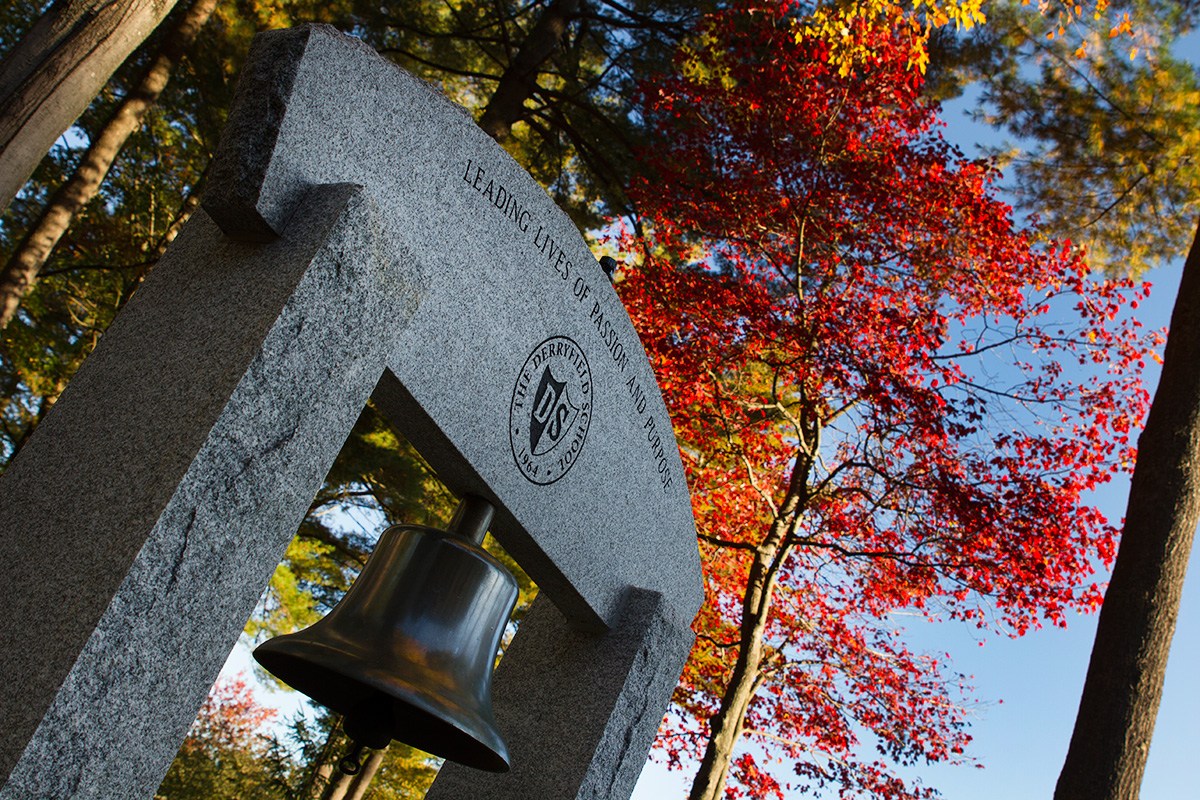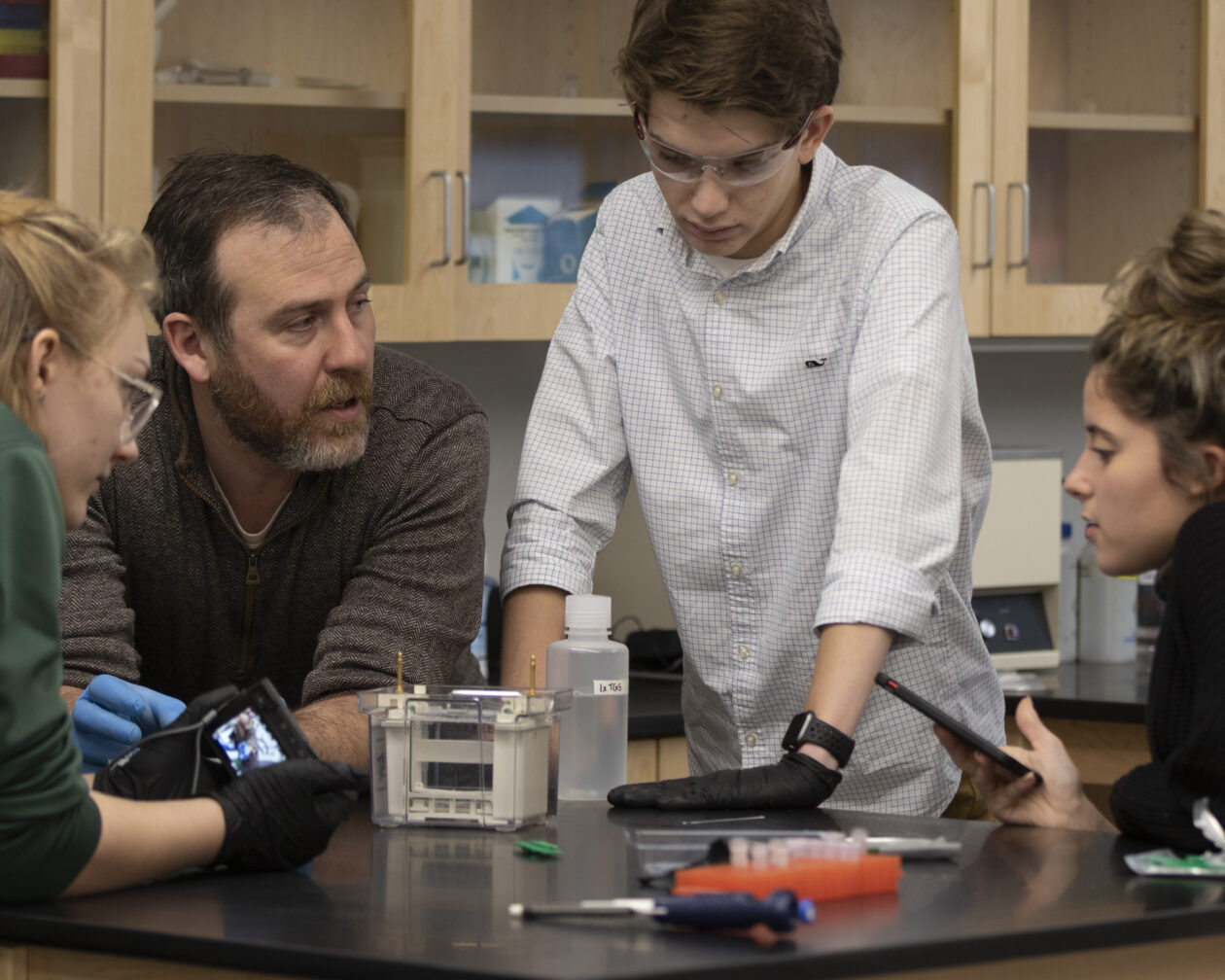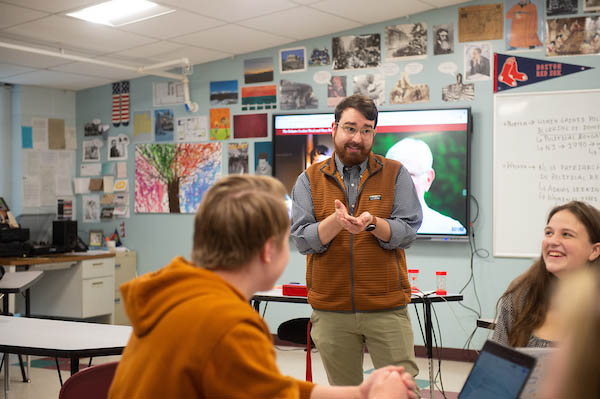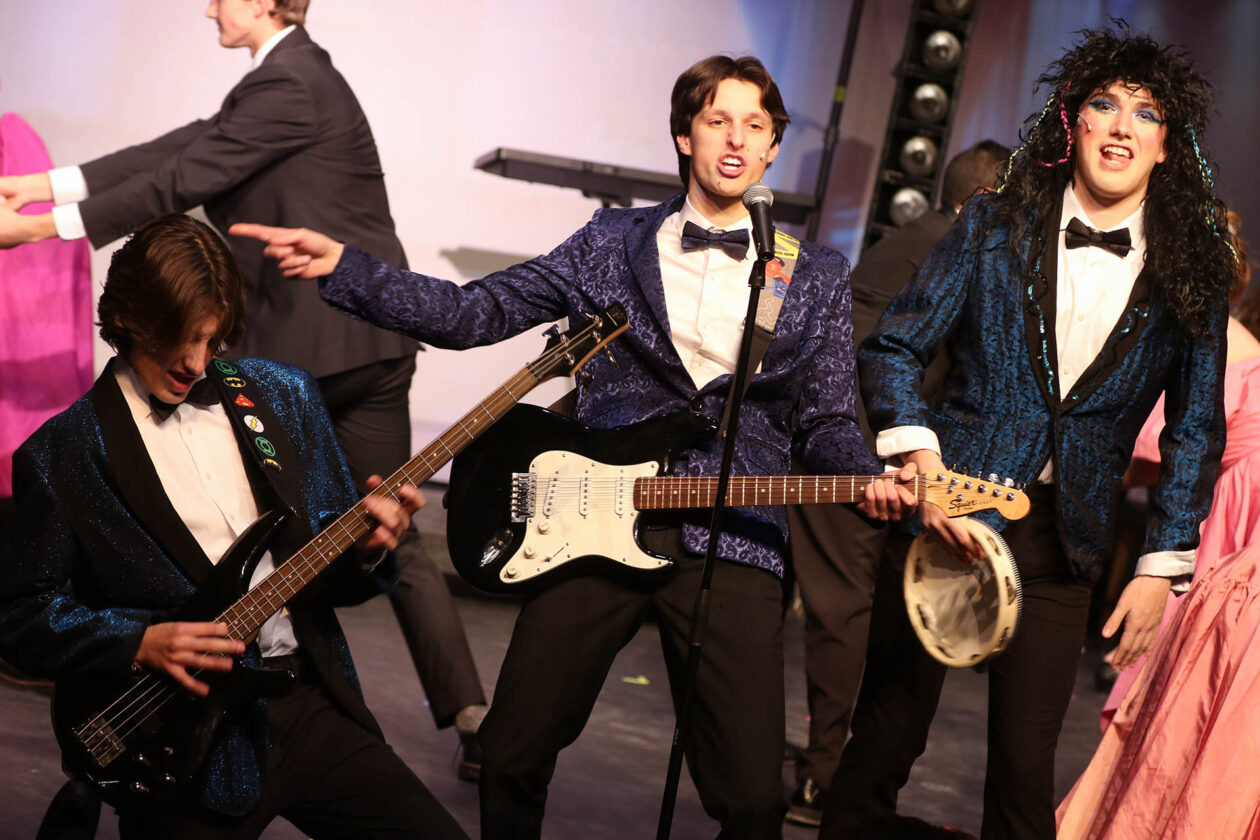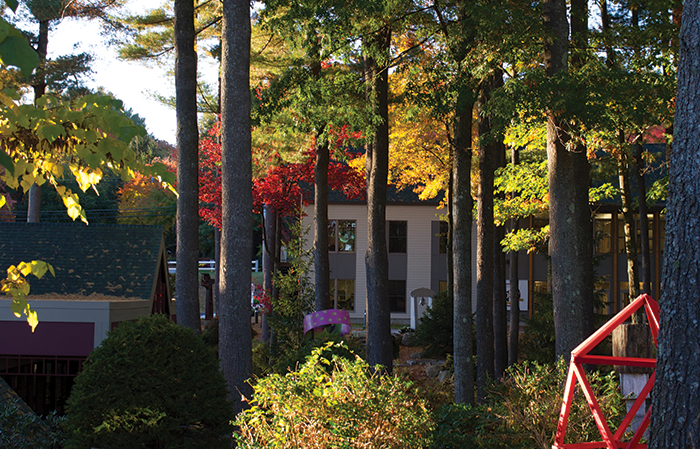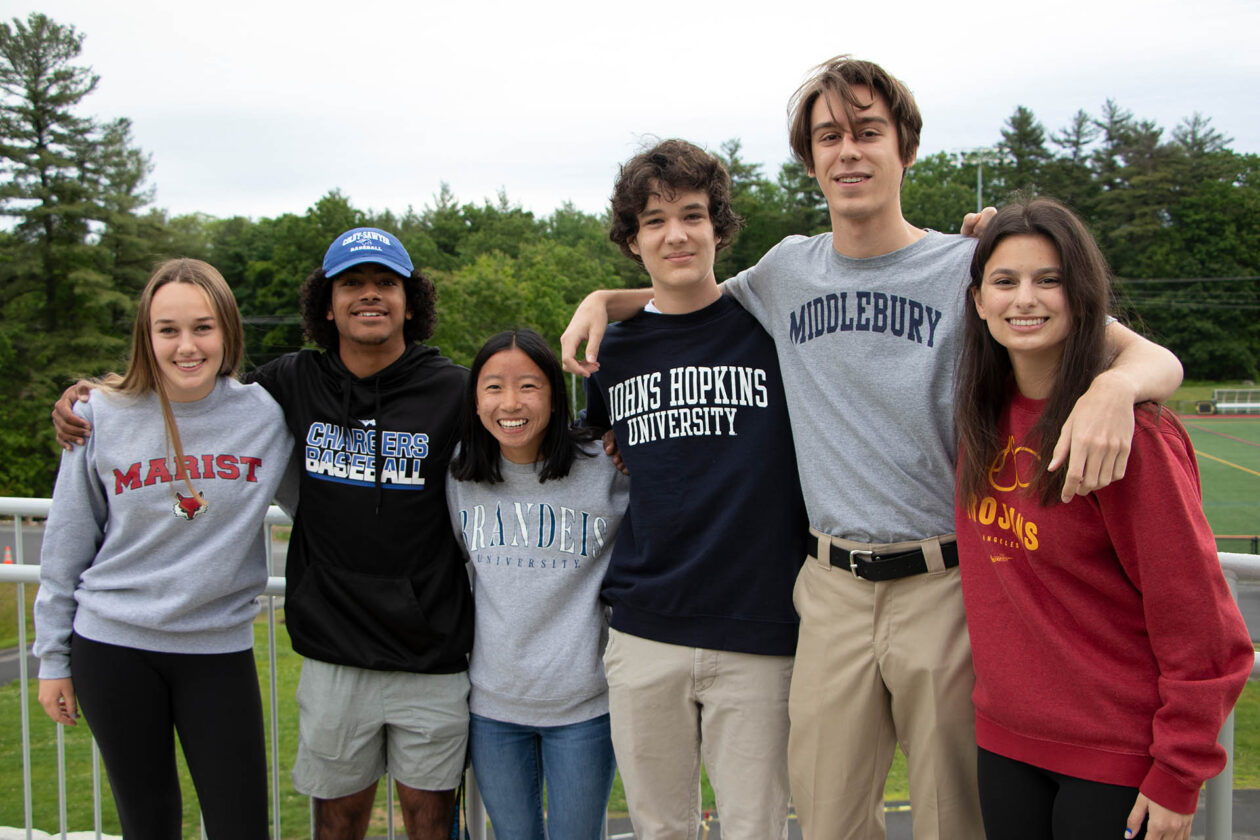Upper School History
The Philosophy
Knowledge of the past provides students the essential foundation for democratic participation and global citizenship in a rapidly changing and interrelated world. Our students graduate with a strong grasp of both US and global history, and the ability to learn independently and see issues from a variety of perspectives, which leads to a clearer understanding of the present. While the core skills of analytical reading, writing, debating, and researching are consistently taught, creativity and flexibility in the classroom are also hallmarks of Derryfield’s history department. All of these skills combine to enhance individual learning and to develop within each student a love for historical inquiry.
Histories of Modern Asia and Africa: Confronting Imperialism (Year Long)
Open to: Grade 9
This course introduces students to the modern political and cultural history of countries grappling with the legacy of imperialism in Asia and Africa. Using primary and secondary sources, students examine topics such as Belgian imperialism in the Congo and its aftermath, the rise and fall of the Japanese Empire, South Africa’s struggle against apartheid and the colonial experience on the Indian subcontinent. The core purpose of the course is to examine how specific states grappled with decolonization and sought to build new political and economic systems amid competing ideological viewpoints. Day to day, the class consists of Socratic discussions revolving around artwork, music, and films to provide insight into the experiences of individuals, ordinary and extraordinary. This course provides a strong foundation for thesis-driven writing, and active reading methodology to build critical thinking skills. Students will have a chance to practice and refine persuasive communication methods like analytical writing and presentations using a variety of platforms. The year will finish with an extensive project to begin developing introductory research skills.
Histories of Modern Asia and Africa: Confronting Imperialism Honors (Year Long)
Open to: Grade 9
Like Histories of Modern Asia and Africa: Confronting Imperialism, this course introduces students to the modern political and cultural history of countries grappling with the legacy of imperialism in Asia and Africa. Using primary and secondary sources, students examine topics such as Belgian imperialism in the Congo and its aftermath, the rise and fall of the Japanese Empire, South Africa’s struggle against apartheid and the colonial experience on the Indian subcontinent. The core purpose of the course is to examine how specific states grappled with decolonization and sought to build new political and economic systems amid competing ideological viewpoints. Day to day, the class consists of Socratic discussions revolving around artwork, music, and films to provide insight into the experiences of individuals, ordinary and extraordinary. Students selecting this course should have a strong foundation in thesis-driven writing, and active reading methodology, allowing for the introduction of more scholarly sources and more nuanced writing. This course will hone already strong persuasive communication skills in modes like analytical writing and presentations using a variety of platforms. The year will culminate with a research paper that draws on not only student research skills, but also their critical thinking and communication skills.
World History: Riots, Revolutions, and Reforms (Year Long)
Open to: Grade 10
Modern world history is a story of riots, revolutions and reforms. This course explores this history by examining revolutionary events in Europe and Latin America from the 17th through the 20th centuries. Beginning with the Enlightenment, it charts how evolving transnational ideas about the meaning of progress dramatically shaped world history. First charting those ideas with the overthrow of Louis XVI in the French Revolution and the rise of Toussaint Louverture in Haiti, the course asks students to grapple with the power of ideology as an agent of historical change. The course pays particular attention to the history of political philosophies and social forces in its discussion of events including the Industrial Revolution, the Bolshevik Revolution, the rise of Nazi Germany, the Cuban Revolution and the Cold War. This exploration engages students in close reading of primary sources such as Primo Levi’s Survival in Auschwitz, encouraging reflection on the meaning of historical change for individuals, ordinary and extraordinary, who lived through these events. The structure of the course also grants students the space to continue to polish foundational skills such as effective reading, writing, researching and communicating in various modes. These skills culminate in a Capstone Project which provides the students the opportunity to explore a world revolution of their own choosing and demonstrate the mastery of their skills one final time. Students emerge with a heightened understanding of the ways in which profound revolutionary events have shaped the contemporary world, and with the skills they need to find success as budding historians.
World History: Riots, Revolutions, and Reforms Honors (Year Long)
Open to: Grade 10
World History: Riots, Revolutions, and Reforms Honors invites students to explore the profound global impact of riots, revolutions, and reforms from the 17th through the 20th centuries. This advanced course for the 10th grade emphasizes critical analysis and independent thinking skills as students investigate revolutionary movements, primarily in Europe and Latin America. Special attention is paid to the Enlightenment philosophies as students trace the evolution of transformative ideas about freedom and liberty and its dramatic influence on world history. Key focus points throughout the year will include the French Revolution and the overthrow of Louis XVI, the Haitian Revolution led by Toussaint Louverture, the impacts of modernization as it pertains to the Industrial Revolution and WWI, the Bolshevik Revolution in Russia, the rise of Nazi Germany and the corrupt politics of Fascism, and Castro and Che Guevara in the Communist Revolution in Cuba.
Through close analysis of primary sources such as Primo Levi’s Survival in Auschwitz, personal letters from Stalin, and more, students engage with the real and collective impact of revolutionary change. The course encourages students to investigate the power of ideology and political philosophy as agents of historical change. In addition, students will develop a nuanced understanding of historical events as students refine advanced skills in critical reading, analytical writing, research, and communication.
The course culminates in a Capstone Project, where students research and analyze a world revolution of their choice, demonstrating mastery of historical inquiry and academic rigor. This incorporates both a written analytical and oral presentation component as students seek to model authentic historical storytelling. This honors-level curriculum equips students with a sophisticated understanding of revolutionary movements while pursuing a more rigorous history curriculum pathway. Students should leave this course with the ability to reflect on the lasting effects of revolutions on the modern world while developing the intellectual tools essential for success in higher-level historical studies and beyond.
United States History (Year Long)
Open to: Grades 11 & 12
This study of United States history asks students to consider the ways that Americans are shaped by their past and the ways that we shape our understanding of it. Students use books, letters, photographs, songs, film, television and everything in between to study contrasting views from historians and historical participants and draw their own conclusions. The class is designed to encourage student interaction, and students are asked to take sides and defend their opinions on significant historical questions as they make connections across the long term of American history. The course introduces students to the varieties of historical argument as well as the different kinds of evidence that can underpin them. Students will consider important debates on issues ranging from the radicalism of the American Revolution to the effectiveness and origins of the New Deal. In the process, students develop key skills in effective reading, analytical writing and substantive discussion.
Advanced Topics History: American Public History (Year Long)
Open to: Grades 11 & 12
This course is designed around the notion that history matters to Americans today. Students will explore the ways that Americans make their memories of American history and how those memories shape views of contemporary issues in American life. In this course, students will come to understand the story of American history, but will also become historians as they dive into seven particular debates that have puzzled the best historical minds. Students will interrogate the complex arguments made by professional historians before evaluating the merits of those arguments by investigating the sources and evidence used by those historians. As students develop conclusions about these contentious issues in the American past, they will consider how the public remembers these issues and how they should be remembered. Students will shape historical memory as they develop public interventions related to these topics in modes ranging from museum exhibit designs to web pages. This course will culminate in an individual research project as students choose one major issue discussed throughout the year and conduct their own historical research in physical and digital archives across the country.
Humanities Seminar Fall: Finding Truth (Embedded Honors Option) (F)
Open to: Grades 11 & 12
The fall term in Humanities Seminar seeks to answer the following question: How can we determine what is true or right in our lives? How do differences in understandings of truth influence the way people act? Using the philosophies of Plato, Nietzsche, Kant, Zhuang Zhou and others, we will analyze art and literature to explore the views of people in different times and come to a deeper understanding of the development in understanding of these concepts. We will begin by studying the cosmologies of ancient people and how they find truth in a world they do not fully understand and chart the development in understanding through the subsequent ages. Students will use their understanding to analyze the art, literature and practices of different cultures to understand how they reflect ideas of truth in the purposeful life. This seminar-style class will rely heavily on analysis in both projects and class discussion. Humanities Seminar is an interdisciplinary course that considers the intersection of history, literature, the arts and culture. Students may enroll for a single term in the fall or winter terms. The fall or winter term is a prerequisite for the spring term. This course can be taken either as a History or English credit. Generally, this course is offered as a second History or English course to juniors.
Humanities Seminar Winter: Ethics of Power (Embedded Honors Option) (W)
Open to: Grades 11 & 12
In every sphere of life, there are those who are in positions of power over others. The winter term in Humanities Seminar will explore the ethical and philosophical theories behind power dynamics and seek to understand how to define and practice ethical leadership. We will begin our study in the Age of Enlightenment with the idea of the “social contract” and delve into the ideas of moral theory and ethics as they relate to power dynamics within the family, the government and interpersonal relationships. Using the philosophies of thinkers such as Locke, Mill, Machiavelli, Confucius, Wollstonecraft and others, students will analyze literature and art of different cultures to explore the basis and justification for historical power structures. The course will culminate in a project in which students attempt to determine what ethical practice of power looks like by using an example of their choosing. This seminar-style class will rely heavily on analysis in both projects and class discussions. Humanities Seminar is an interdisciplinary course that considers the intersection of history, literature, the arts and culture. Students may enroll for a single term in the fall or winter terms. The fall or winter term is a prerequisite for the spring term. This course can be taken either as a History or English credit. Generally, this course is offered as a second History or English course to juniors.
Humanities Seminar Spring: Ancient Moderns, Modern Ancients (Embedded Honors Option) (S)
Open to: Grades 11 & 12
Prerequisite: Either Humanities Seminar Fall or Humanities Seminar Winter
The spring term in this course will serve as a culmination of the topics covered in the fall and/or winter term. Students will be engaging in a project experience in which they examine modern literature, art or film and connect it to ideas presented earlier in the year. The focus for students will be to map the progression of ideas from ancient or renaissance sources in order to explain their relevance to and impact on the modern world. Final products will be displayed in a public forum where students will engage with their peers about their experience. Humanities Seminar is an interdisciplinary course that considers the intersection of history, literature, the arts and culture. Students may enroll for a single term in the fall or winter terms. The fall or winter term is a prerequisite for the spring term. This course can be taken either as a History or English credit. Generally, this course is offered as a second History or English course to juniors.
International Relations Fall: Bargaining and War in the World System (Embedded Honors Option) (F)
Open to: Grades 11 & 12
In the fall term, students explore theoretical foundations in the discipline of Security Studies, and will test that theory to explore contemporary issues from the conflict over Kashmir to the Russo-Ukrainian War. This course will consider war in human history as the result of failure in bargaining between states over issues ranging from territory to political ideology. By investigating how and why the breakdown of bargaining between states leads to war, students will acquire the tools of international relations analysis and the opportunity to use them in historical and contemporary inquiry. The Honors Option in this course will focus on war and disorder at the state level and compare intrastate conflict to interstate conflict. This course is offered during alternating academic years with the next offering in 2026-2027. Generally, this course is offered as a second History course to juniors.
International Relations Winter: Human Rights and International Law (Embedded Honors Option) (W)
Open to: Grades 11 & 12
In the winter term, students will consider the pressing human rights concerns facing the world today. Students will begin the term by exploring the history of Human Rights as a concept from the French Revolution to the United Nations Universal Declaration of Human Rights. Students will then move to consider a series of case studies of the development of international law related to issues ranging from the 1994 Rwandan Genocide to the 2015 European Migrant Crisis. This course is intended both to help students wrestle with the difficult questions posed by the idea of universal human rights and to develop an understanding of the use of both customary and treaty law in the international system. The Honors Option in this course focuses on the rights of women under international law and considers how to promote the rights of women despite threats of violence and lack of access to political institutions. This course is offered during alternating academic years with the next offering in 2026-2027. Generally, this course is offered as a second History course to juniors.
International Relations Spring: Cold War, Nuclear Peace? (Embedded Honors Option) (S)
Open to: Grades 11 & 12
In the spring term, students will examine the proliferation of nuclear weapons since 1945 and the concept of the “Nuclear Peace.” In general, students will be interested in discovering whether nuclear weapons are indeed a tool that promotes relative peace because of their deterrent nature or if nuclear weapons present a threat to world peace. Students will begin their study of nuclear weapons with a careful examination of the bipolar system of the Cold War and the logic of Mutually Assured Destruction before turning their attention to attempts at disarmament at the end of the Cold War and the proliferation of nuclear weapons in the hands of both states and nonstate actors in the present. The Honors Option in this course focuses on the representation of nuclear power and nuclear weapons in the popular imagination through film, television and literature. This course is offered during alternating academic years with the next offering in 2026-2027. Generally, this course is offered as a second History course to juniors.
World Politics Fall: Terrorism in the Contemporary World (Embedded Honors Option) (F)
Open to: Grades 11 & 12
Students will spend the fall term considering the role of terrorism in the world today. Students will consider the motivations that cause young people of their own age to join terrorist groups around the world and then consider the social, ethical and practical questions raised by the different approaches states take to combat terror. This course will begin with a focus on the history of terrorism and the evolution of the threat before turning attention to various options available to respond to that threat including economic, social, law enforcement and military responses. The goal of the course is to allow students to evaluate the different responses and consider how a state can or should prioritize various responses. The Honors Option for this course focuses on the threat of domestic terrorism in the United States. This course is offered during alternating academic years with the next offering in 2025-2026. Generally, this course is offered as a second History course to juniors.
World Politics Winter: Development, Sustainability and Inequality (Embedded Honors Option) (W)
Open to: Grades 11 & 12
During the winter term, students will tackle the question: how can a billion people move out of poverty without irreversibly harming the natural world upon which human life depends? Focusing on the threat of climate change in the Global South, students will encounter key ideas and debates surrounding the topics of foreign aid, social entrepreneurship, and the role of government in addressing global poverty while keeping average warming below 2℃. Each student will follow a particular country in the Global South throughout the term as they learn about the economic, security, environmental and human rights issues that this country faces in the context of global institutions such as the World Bank, the International Monetary Fund and the United Nations. Students will consider the legacies of colonialism and the future of the developing world as they explore the best ways to lift the world further out of poverty while combating climate change. The Honors Option for this course focuses on the impact of climate change on human health. This course is offered during alternating academic years with the next offering in 2025-2026. Generally, this course is offered as a second History course to juniors.
World Politics Spring: Gender Equality on the World Stage (Embedded Honors Option) (S)
Open to: Grades 11 & 12
A famous political dictum from China holds that “women hold up half the sky,” but women remain underrepresented in positions of power across the globe. Students will spend the spring term focused on the experiences of women in the 21st century world through a case study focused on Latin America. They will investigate human rights concerns related to gender, develop an understanding of the role of women in development and compare women’s access to political power at the state level across the continent. Students will ask how international and domestic policy can or should be shaped to address the particular concerns of women. This course will conclude with a simulated meeting of the UN Committee on Eliminating All Forms of Discrimination Against Women, which will make recommendations for improving the position of women in global governance. The Honors Option in this course will focus on contemporary masculinity. This course is offered during alternating academic years with the next offering in 2025-2026. Generally, this course is offered as a second History course to juniors.
Advanced Topics History: United States History Since 1960 (Year Long)
Open to: Grade 12
Prerequisite: Completion of US History or AT American Public History
Open only to seniors, US History Since 1960 offers the academic rigor of a college course. It enables students to recognize that recent American history—like historical scholarship at large—doesn’t offer a neat list of “historical lessons” so much as it imparts greater caution about the country’s challenges in the present. The complexity of recent American life, students learn, defies partisan summation even as the political climate has grown vastly more dogmatic. As a result, students come to appreciate that the ultimate fate of the American Republic remains undecided—there is no certain Hegelian curve towards progress; the world’s greatest modern experiment in democratic governance can still fail. Topics include U.S. foreign policy from the Cold War through the War on Terror; the American presidency since John F. Kennedy; and social movements such as the African American battle for civil rights and second wave feminism. The course is reading and writing intensive and culminates in a larger class project designed to “make historical nuance go viral” in the contemporary media.
